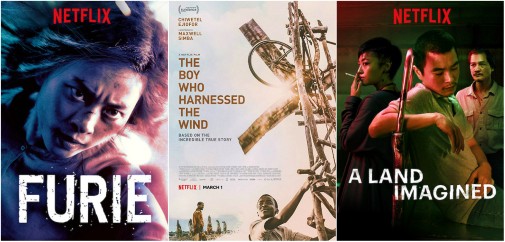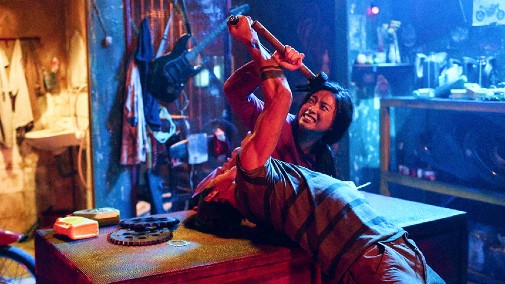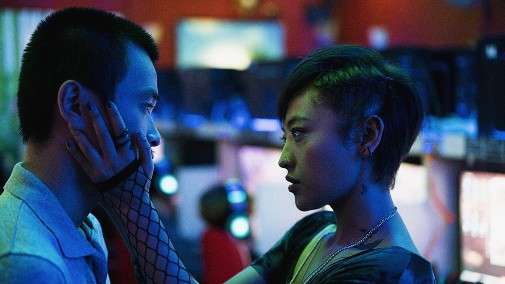Best International Feature: Vietnam, United Kingdom & Singapore's contenders
 Saturday, December 14, 2019 at 3:30PM
Saturday, December 14, 2019 at 3:30PM 
The Oscar shortlists are almost here. On December 16th, we'll finally know which are the 10 films that go forward in the race for the Best International Feature award. To whittle down the record-breaking number of 91 submissions into a sparse 10 won't be an easy feat and there are bound to be many snubs causing controversy and discussion among Oscar buffs. While we wait for that most anticipated date, I invite you to continue our adventure through those 91 submissions. This time around, we're focusing on films that are currently available on Netflix.
There's Vietnam's story of a vengeful mother in search of her kidnapped daughter; the UK's tale of human perseverance in Malawi; and Singapore's oneiric reveries about disappeared drivers and insomniac detectives…

FURIE (Vietnam)
While many may find fight scenes distasteful, I've long felt there's a strange appeal to their apparition onscreen. Bold colors in quick flashes, bodies contorting in a ballet of violence across rapidly shifting compositions, the pound of impact and the sighs of exhaustion, the cut of the editor's sword and the gesture of the actor's fist in perfect harmony – it's a dance of cinema, rarefied and depurated into its most primordial form. It's when there's just movement and time, light and rhythm, audiovisual spectacle presented with stark simplicity and unpretentious formality. Even the most anemic of stories can be redeemed with a couple of good fights thrown in for good measure. Lê Văn Kiệt's Furie follows that very same formula, building a most unconvincing revenge plot as a mere foundation for various action sequences of growing complexity. For her part, lead actress Veronica Ngo brings with her the magnetism of a veritable movie star to spark life into the whole ordeal and hide some of the least successful directorial choices. Still, the fragilities of the script don't always go by undetected and the fluidity of the narrative is often marred by unnecessary repetitions. B-

THE BOY WHO HARNESSED THE WIND (United Kingdom)
It seems Chiwetel Ejiofor is not only a great actor but a talented director too. In his debut feature, the neophyte filmmaker shows a great eye for visual storytelling and how cinema can make quotidian struggles into the stuff of legend. His use of color and landscape is of particular brilliance, with arid yellows and muddy browns alternatively conquering the frame and painting the portrait of a community as an extension of the earth in which their sustenance is grown. On the other hand, Ejiofor's aptitude to capture the nuances of human psychology is less evident. The Boy Who Harnessed the Wind tells the inspiring true story of an African teenage boy who used the blessings of his education and natural curiosity to bring water to a community starving during a period of bad crops. Such material seems perfect for human drama, but the director is strangely reluctant to explore the interiority of the protagonist. In what becomes a tale of paternal tradition in conflict with youthful modernity, Ejiofor's camera seems only interested in perusing the souls of the older generation, its idiosyncratic social stratifications, and political strife. Such dramatic imbalances don't spoil the entirety of the enterprise but rob it of potential greatness. B

A LAND IMAGINED (Singapore)
Last year, Siew Hua Yeo won the Golden Leopard at Locarno for this neon-tinged mystery that mixes elements of film noir and social realism. It focuses on the disappearance of a Chinese construction worker in the concrete jungle of Singapore's urban expansion. However, its structure is nothing like that of a traditional crime story. The investigation is as spiritual as procedural, with the recent past intromitting the present and identities flowing into each other, digital oasis and cheap pleasures distracting the characters as they let themselves be consumed by the slippery narrative. It's an enticing proposition that verges on the hypnotic, evoking nightmares of a modern metropolis where everyone is too tired to sleep and lucidity slowly seeps away from the bodies of desperate men and ethereal women. Is it a noir or the dream of a noir? Are we watching reality or the fantasies of a dead man? Is this an abstraction of the quotidian or the madness born out of exploitative labor? Such questions pop up frequently through this cinematic experience of restless lives shrouded in perpetual night. There are no answers but somehow that doesn't frustrate. The ambiguity seduces instead, enchanting the viewer into a spell of somnambulistic doom. B+
I doubt any of these films can make it to the shortlist, but The Boy Who Harnessed the Wind seems like the one most up Oscar's alley. In any case, don't miss these precious jewels of international cinema.



Reader Comments